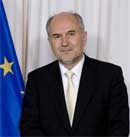 Negative political trends in Bosnia must be taken very seriously and require the urgent attention of the European Union, the international community’s High Representative to Bosnia Valentin Inzko said.
Negative political trends in Bosnia must be taken very seriously and require the urgent attention of the European Union, the international community’s High Representative to Bosnia Valentin Inzko said.
“In the last four years Bosnia has been in a political stalemate…not a single new reform has been adopted that would give the state increased competences needed for active participation in the EU accession process,“ Valentin Inzko told members of the European Parliament in Brussels on Tuesday according to a statement issued by his office.
Inzko warned that the current challenges in Bosnia must be taken “very seriously“, urging the EU to be “proactively engaged in order to reverse the current negative political trends”.
“Of outmost importance is to make it clear to the political leaders (in Bosnia) that the current challenges to the Dayton agreement and the High Representative’s powers are unacceptable,” Inzko said, referring to the peace agreement which ended the 1992-95 war in Bosnia.
The post of the High Representative was created under the Dayton peace agreement and was later given the authority to impose legislation and dismiss local officials who obstruct the implementation of the peace agreement.
However, Bosnian Serbs have recently stepped up their opposition to the High Representative’s continued presence in Bosnia, accusing Inzko of abusing his powers and refusing to accept his decisions.
A long simmering conflict between the Bosnian Serb government and Inzko reached boiling point in December following the envoy’s decision to extend the mandate of international judges working on war crimes cases at Bosnia’s state court.
The Bosnian Serb government rejected Inzko’s decision and said it would call for a referendum to allow citizens of the country’s Serb-dominated entity to decide on the issue.
Under the Dayton peace agreement, Bosnia was divided into two highly autonomous entities – the Serb-dominated Republika Srpska and Croat-Bosniak (Bosnian Muslim) federation. Each entity has its own government, parliament and presidency, but the two are linked by weak central institutions.
The international community has long insisted that more powers be transferred to those central institutions in order to make the country more functional, but Republika Srpska has largely opposed such action and insisted on retaining its autonomy.
The entity has been accused of blocking the work of central institutions and preventing the adoption of important reform laws required to accelerate the country on its way to membership in the European Union.
Defying repeated warnings by the international community, the Bosnian Serb government adopted a draft law on Tuesday which, if passed by the region’s parliament, would pave the way for a referendum on Inzko’s authority.
 Eurasia Press & News
Eurasia Press & News



